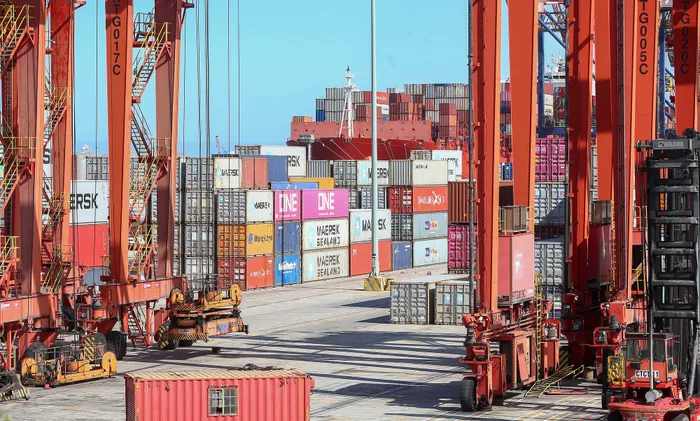Old Mutual's economist dashes hopes for the required 6% economic growth in South Africa

Busisiwe Mavuso, CEO of Business Leadership South Africa, said the GNU was showcasing notable progress in creating a more conducive business environment.
Image: Leon Lestrade/ Independent Newspapers
Old Mutual Group chief economist, Johann Els, has quashed any lingering hopes for sustained growth rates of 6% in the country's gross domestic product (GDP) on the back of significant lingering structural constraints.
Though Els on Thursday said he was expecting an “improved growth trend” in the outlook for 2025 for South Africa, the economy was faced with serious structural constraints, which had resulted in the average annual growth rate of 1.1% over the last 16 years.
“I do expect that uplift in that growth underlying trend towards 2.5% to 3% on the back of significant private sector participation in the economy. And it's not always easy to present a slightly better growth outlook,” Els said during a midyear economic update.
“But in my view, this isn't an optimistic outlook. It's a balanced view that we should see better underlying growth because we are making some headway into reducing the structural constraints in the economy.
“But to be clear, growth around 5% to 6%, which is what South Africa actually needs, will never happen in South Africa. It's highly unlikely to ever get, on a sustained basis at least, towards 5% or 6% economic growth. Highly unlikely. But we can get from around 1% slightly less volatile growth as well towards 2.5% to 3%.
“We've got significant structural constraints in the labour market, significant skills deficit, and an over-regulated labour market that will prevent us from ever achieving that.”
However, Els said what was happening in terms of electricity, water and logistics reforms will get the economy from 1% towards 2.5% to 3%.
He said that will make a material difference in terms of confidence and profitability, driving to some extent, even employment growth, positive employment growth despite those structural issues in the labour market.
“So growth can start to improve over the next few years, where especially the reduction in the electricity deficit will help significantly. Gradually, the private sector's role and participation in the logistics arena, helping out the Transnet issues,” Els said.
“Foreign investors are always looking at more stable countries. If we look at the big reason for weak economic growth over the past 16 years or so, the lack of confidence in policymakers,” Els said.
“When growth was strong in that period roughly in the early 2000s towards 2007-08, that was a period when there was little concern about politics and policy. The result of a survey done by the Bureau of Economic Research at Stellenbosch University asking businesses what their view of the political climate and policy climate [shows] that concern moved up dramatically, economic growth collapsed, and a Reserve Bank study showed that growth would have been more than 2%.
“Now, what we have seen is after the formation of the Government of National Unity (GNU) in June last year, that concern has improved quite a bit, eased quite a bit, meaning more confidence in this new government to actually implement the better policies.”
Busisiwe Mavuso, CEO of Business Leadership South Africa, said the GNU was showcasing notable progress in creating a more conducive business environment.
Mavuso said as much as the country was facing so many geopolitical challenges and the impact of the Trump tariff regime, it has made quite a few strong strides and achieved solid wins in an effort to try and ensure a conducive environment within which business should trade.
“There are four network industries that we have: energy, transport and logistics, water, crime and corruption. And out of those four, three have been dysfunctional for quite a while, only telecoms have been functioning as it should,” she said.
“And now we are actually seeing progress coming along on the energy, on the transport logistics, and on the water front as it were. So as a business community, we are seeing a GNU that has been quite committed to delivery.”
Mavuso indicated that hope lies particularly in the energy reforms, with the minister’s commitment to achieving energy security rather than simply maintaining existing structures being prioritised.
However, challenges are not absent as Mavuso said the mounting municipal debt remained a pressing concern, and the implications of union negotiations continued to draw scrutiny.
“Municipal debt continues to be a challenge, and [the Minister of Electricity] started intervening in municipalities. I don't know if you would have seen, three weeks ago, he secured the City of Joburg's commitment to pay R3.2 billion to Eskom over the next four years, and he's going to continue to do that with other municipalities because that Eskom debt by municipalities is growing at R3bn every month,” she said.
“And when you look at the work that is being done by Operation Vulindlela II, their focus on municipal reform is also going to be reinventing the electricity revenue of the municipality to ensure that that money can actually go to Eskom. So those are all encouraging things that we're actually seeing.”
BUSINESS REPORT